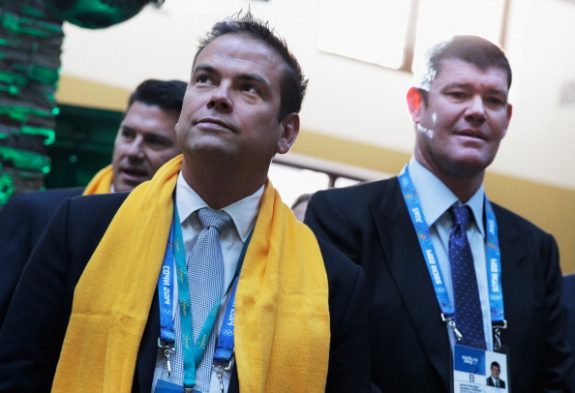Comedy without art (part 13)

By Dr George Venturini
Following federal budget changes two years ago, the corporate sector – and particularly the financial sector – now picks up the $330 million tab for funding the corporate regulator.
“The banks are paying to ensure that ASIC has the resources and powers it needs to be a tough cop on the beat,” [Treasurer] Mr. Morrison announced at the time.
Indeed, it does. But that raises an important question. Is ASIC’s role to provide the Federal Government with revenue or is it an enforcement agency?”
And the banks were not the sole entities coming in the Commission’s cross-hairs.
Anyway, for good or bad, the Royal Commission arrived at the end of 2017.
In the end the Turnbull Government was forced to drop its resistance to the appointment of a Royal Commission when influential Nationals parliamentarians threatened to revolt and to cross the floor, should the matter have come to a vote. Amongst them was Senator John ‘Wacka’ Williams who, through Senate Committee investigations, for years had pursued the malfeasance of the banks. Stephen Letts, the business reporter of the Australian Broadcasting Commission, has written a very interesting backgrounder relating how in 2011 Senator Williams introduced Mr. Jeff Morris, Commonwealth Bank whistleblower to Ms. Adele Ferguson, financial columnist for The (Melbourne) Age. It began Ferguson’s public exposure of the extraordinary wrongdoings of the banks and other financial firms. No other journalist in Australia has done so much, so consistently, so obstinately to shine a torch into the dark corners of business practice, above all in the financial sector. (S. Letts, ‘The whistleblower, politician and journo who hauled the banks before a royal commission,’ abc.net.au, 1 February 2019).
A few weeks after it began its work, the Commission was faced with the case of the A.M.P. The Australian Mutual Provident Society was formed in 1849 as a non-profit life insurance company and mutual society. In 1998 it was demutualised into an Australian public company, A.M.P. Limited, and listed on the Australian and New Zealand stock exchanges. It was still intended, by definition, as a friendly, benevolent society. By early April 2018 it was revealed that A.M.P. had been charging clients, even dead ones, fees for not delivering any services.
On 20 April 2018 Mr. Craig Meller resigned as C.E.O. after it was revealed before the Royal Commission that A.M.P. charged clients for financial advice which was not provided, and misled the Australian Securities and Investments Commission on numerous occasions. More than $1 billion in market value was stripped from A.M.P. shares as news of the company’s failings were revealed before the Royal Commission. In the wake of such revelations, and his resignation from the A.M.P., Mr. Meller resigned as a financial services adviser to the Turnbull government.
On 30 April 2018 Ms. Catherine Brenner would resign as chairperson and Mr. Mike Wilkins was appointed acting C.E.O. and chairperson.
On 8 May 2018 two directors, Ms. Vanessa Wallace and Ms. Holly Kramer, would announce that they would not be seeking re-election, in response to an imminent protest vote organised by the shareholders in the aftermath of the performance at the Commission. Ms. Patty Akopiantz also announced that she would be resigning at the end of the year.
In November 2018 A.M.P. would admit to a second overcharging scandal.
There’s is hardly anything new in any of it.
Back in 2006 A.M.P. had become embroiled in what then appeared to be the scandal of the decade. It was caught overcharging thousands of customers, switching them into expensive and poorly-performing products designed to enrich planners and the organisation, at the expense of clients.
Despite the obvious criminality – such practice is known outside the corporate world as theft – no-one faced charges and the A.M.P. was never subjected to a civil damages case. A.S.I.C. felt satisfied by having A.M.P. sign an “enforceable undertakings”.
If the highly-publicised action had any effect, it was to send a message to the financiers that financial planners and the wealth management industry could operate with impunity.”
And Verrender remarked: “Perhaps that explains why our banks, obliged to immediately inform the regulator of breaches, routinely have taken years to do so. Or why the AMP and its board didn’t think twice about meddling in a so-called independent report from law firm Clayton Utz on 27 different occasions.”
Between them, the four banks and AMP in recent years have gouged more than $220 million from clients for services they never even intended to provide.
And the penalty for this theft? Just over a week ago, a few days before all this blew up in the royal commission, ASIC had the CBA, the worst offender by far, sign an enforceable undertaking for overcharging clients $118 million.
No court case. No-one personally held to account.
And it’s part of a repeating pattern.
Less than 18 months ago, CBA signed an enforceable undertaking over its role in rigging foreign exchange markets. As part of the settlement it made a $24 million “donation” to a program to improve financial literacy.”
And so much for deterrents.
“It wasn’t always this way.” – Verrender went on. “The rot set in about a decade after ASIC was established in 1991, when then-chairman David Knott announced a new tactic. Rather than run criminal cases, ASIC instead would launch civil action against the top end of town.
The burden of proof was lower, he argued, allowing for greater court success. And with a wider approach, the enforcement agency could then hone in on specifics on criminal matters.
Shortly afterwards, One.Tel – the telco brainchild of James Packer [the son and successor to Kerry Packer, Turnbull’s long time advisee], Lachlan Murdoch, Jodee Rich and Brad Keeling – collapsed.
What ensued was one of Australia’s longest-running civil court cases. The poorly run case was a disaster, costing the regulator $20 million in legal bills.
It went down in a highly publicised insider trading case against Citigroup and blew $30 million in an ill-fated attempt to prove Andrew Forrest misled investors.
If its reputation was tarnished, things only deteriorated further when former Telstra director and alleged comedian Steve Vizard struck a deal with ASIC over his use of confidential Telstra information.
He admitted the charges, but in exchange for a deal where he would only be subject to civil penalties.
If there were any doubts ASIC had gone soft, the judge in that civil case, Justice Ray Finkelstein, took it upon himself to double the penalty recommended by the regulator.
Similar comments were made by Justice Dowsett [in March 2018] when he imposed what even he believed was a lax penalty on Storm Financial founders Emmanuel and Julie Cassamatis.
The pair, who helped destroy around $880 million for low income vulnerable investors, were fined just $70,000 each and banned from managing a firm for seven years.
“I am inclined to think that the penalty sought by ASIC is on the low side, having regard to the cases to which I have been referred,” he told the pair. (I. Verrender, ‘Banking royal commission: How ASIC went missing in action with the banks,’ abc.net.au, 23 April 2018).
A.S.I.C. boasts an impressive track record before the courts with success rates of up to 97 per cent.
There are two reasons for that. The first is that A.S.I.C. does not take on many cases. And the second is that it generally only goes for soft targets, small operators or individuals without enough money to fight a case.
In 2012/13, in the wake of billions of dollars in corporate collapses, it ran just 25 criminal cases and only 15 civil cases.
The ATM period of Coalition government began in 2013.
In 2017 A.S.I.C. charged 22 people with criminal offences. As a consequence, investors have been forced to take matters into their own hands running class actions through law firms which take a huge slice of any winnings.
Effectively, A.S.I.C. has outsourced its enforcement role to the private sector.
The best thing a government which really ‘means business’ could do is appoint an experienced investigator to head up the organisation instead of the endless procession of bean-counters, investment bankers and corporate lawyers who have sat at the chief’s desk.
Continued Saturday – Comedy without art (part 14)
Previous instalment – Comedy without art (part 12)
 Dr. Venturino Giorgio Venturini devoted some seventy years to study, practice, teach, write and administer law at different places in four continents. He may be reached at George.venturini@bigpond.com.au.
Dr. Venturino Giorgio Venturini devoted some seventy years to study, practice, teach, write and administer law at different places in four continents. He may be reached at George.venturini@bigpond.com.au.
Like what we do at The AIMN?
You’ll like it even more knowing that your donation will help us to keep up the good fight.
Chuck in a few bucks and see just how far it goes!
Your contribution to help with the running costs of this site will be gratefully accepted.
You can donate through PayPal or credit card via the button below, or donate via bank transfer: BSB: 062500; A/c no: 10495969










1 comment
Login here Register here-
Return to home pagePingback: Comedy without art (part 14) - » The Australian Independent Media Network